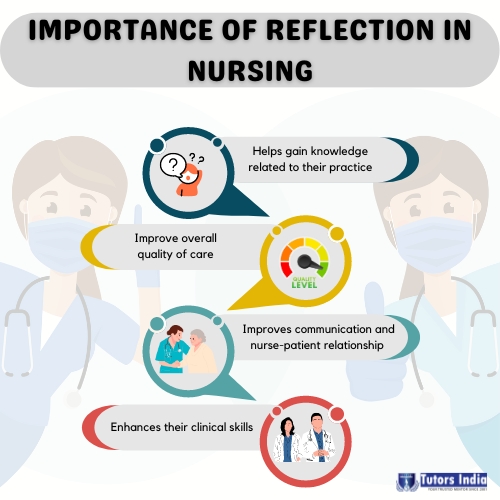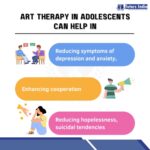The implications of reflection in nursing practice
Importance of communication in nursing
- Communication is a critical tool in nursing practice that results in better patient care and the professional and personal development of the nurses.
- Studies have shown that effective communication significantly improves patient outcomes such as increased satisfaction, decreased pain and better treatment outcomes, saving lives in settings like the emergency rooms, which are the busiest and the most serious parts of a hospital.
- Therefore, along with theoretical and practical knowledge, nurses must have good communication skills, and special attention must be given to improve the communication between nurses, patients, and their caregivers (Jones, 2015).
- Communication and practical skills can be enhanced by a practice known as reflection.

What is reflection?
- Reflection is a process wherein a person refers to their personal experience and recalls what has happened, reconsiders and re-evaluates the experience.
- Reflection encourages people to seek and evaluate solutions in uncertain and challenging situations.
- Reflection has been associated with improved critical thinking and problem-solving skills. In addition, reflection is regarded as proof of professionalism and professional behaviour.
- Research suggests that reflective thinking should be mastered and practised continually (Weingarten, 2016).
Why is reflection important in nursing?
Reflection is crucial for all professions, especially in nurses because:
- The experience of applying the reflection process in a clinical situation instils a sense of ownership in nurses because they gain this knowledge by focusing on their own experience and employing new approaches. They must concentrate on their knowledge, abilities, and behaviours to ensure that they can meet the obligations imposed by this commitment.
- Reflective practice helps to improve quality in healthcare Reflecting on their experiences allows nurses to identify patterns of success and failure, enabling them to make adjustments that improve overall patient care and well-being.
- Reflection in nursing allows nurses to recognise gaps in their knowledge and abilities. This realisation motivates them to seek learning opportunities to improve their skills, such as further training, workshops, or educational resources.
- Nurses can obtain insights into the perspective of patients by reflecting on interactions with patients, leading to better understanding and patient-centred care. This understanding can improve the nurse-patient relationship.
- By writing a reflection report, the practice of reflection helps nurses be more self-aware, self-directing and in touch with their environments (Famutimi, 2021).
Check out our example, ‘Assignment on reflection of clinical skills in nurses, ’ to know more about how reflection improves clinical skills in nurses.
Barriers to Reflective Practice
Miller (2020) has enlisted the most common barriers to reflective practice in nursing. They are as follows:
- Lack of time- Time constraint is the most common barrier to reflective practice in clinical settings.
- Lack of guidance- Nursing students must be encouraged to practice reflection, which helps their professional growth.
- Lack of knowledge- Students often lack the ‘how to’ to reflect and improve their practice.
- Unsupported by organisational culture- The hectic schedule in clinical settings results in a lack of time, which hinders reflective thinking.
What is the implication of reflection for nurses?
The practice of reflection is done by reflective cycle, which is based on reflective models. The reflective cycle should be continuous in which the process of experiencing and reflecting on experience are interconnected.
According to studies, nurses who take the time to reflect on their everyday experiences provide better nursing care, have a better awareness of their actions, and strengthen their communication and professional skills.
It has been observed that nurses who know what has to be done practically often face challenges in expressing what they do verbally. Reflection helps address this challenge and enhance interpersonal skills (Famutimi, 2021).
Conclusion
Reflection is a practice wherein one revisits their experience, recalls what happened, and reconsiders and re-evaluates the experience. Reflection is based on reflective models in nursing and is a continuous process of introspection and improvement. Reflection helps improve communication and professional skills by improving the quality of care and nurse-patient relationship, addressing communication barriers and enabling them to be more self-aware. The process of reflection often requires time and motivation, and nursing students must be encouraged to reflect on their practices to help in their professional growth.
About Tutors India
We are a team of professional academic writers who offer dissertation and assignment help for master’s students in various fields. We understand the challenges nursing students face with their assignments, reflective reports and dissertations. We provide them with customised help that enables them to write their assignments, reports and dissertations confidently. We exercise caution to abide by the university guidelines and ensure the work is of high quality with no errors or plagiarism.
Check out our assignment examples to learn more about how an assignment is written in various fields.
References
- Jones T, Shaban RZ, Creedy DK. Practice standards for emergency nursing: An international review. Australas Emerg Nurs J. 2015;18(4):190–203.
- Weingarten K. The Art of Reflection: Turning the strange into the familiar. Family Process. 2016;55(2):195–210.
- Miller JM. Reflective practice and health sciences librarians: engagement, benefits, and barriers. J Med Libr Assoc. 2020 Jan;108(1):17-28.

 Previous Post
Previous Post Next Post
Next Post